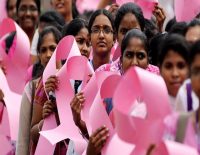AIIMS salvages unique pregnancy: brings alive mother’s dream after seven foetal fatalities

In a rare feat, the All India Institute of Medical Sciences, Delhi saved the life of an anemic foetus with an incompatible blood group with that of its mother by infusing the blood sourced after a worldwide search, which was finally brought from a blood bank in Japan. The instance of incompatibility in the blood group of the mother and the foetus is a rarest of rare condition globally and the case was the first in India with the subject patient losing seven babies in a row due to the medical condition. The AIIMS case was the eighth such instance reported across the globe.
Emphasising that it is the first case of successful pregnancy outcome in alloimmunisation due to Rh 17 Ag in India and eighth case in the world, Dr. Neena Malhotra HOD, Obs & Gynae, AIIMS, said, “the peculiar blood condition styled as Rh 17 Ag refers to the incompatibility between the red blood cells of the mother and the baby in the womb, which may lead to problems for the unborn child due to destruction of the red cells leading to anaemia, jaundice, heart failure and even death of the baby”.
Dr Vatsla Dadhwal, Prof, Dept of Gynae, said, “the most common known incompatibility is due to the RhD antigen and in severe cases of foetal anaemia RhD- blood is transfused to the baby inside the mother’s womb through the umbilical cord. However, in this case, the mother was negative for the Rh 17 antigen which is very rare to find. Due to this, the babies in her womb would suffer from incompatibility and develop anaemia and she had suffered seven pregnancy losses”.
Dr Dadhwal continued when the patient came to AIIMS in her seventh pregnancy, she had already lost her child inside her womb but in that pregnancy the Blood Bank team identified the blood group. In her eighth pregnancy, she came to the AIIMS at the fifth month of pregnancy, when it was found that the baby was already anemic and required blood to be given urgently. Although the blood group had been identified, the blood was not available in India, she said.
With the cooperation from the Social Service department of AIIMS and other NGOs, the Gynae department brought the one unit blood from Japan. Dr Anubhuti Rana said with the available blood, the foetus received 6 blood transfusions inside the mother’s womb and the state of hydrops (heart failure) reverted to normal. The pregnancy continued till eight months when the baby was delivered by a Caesarean section. The blood was imported from Japan for three times.







